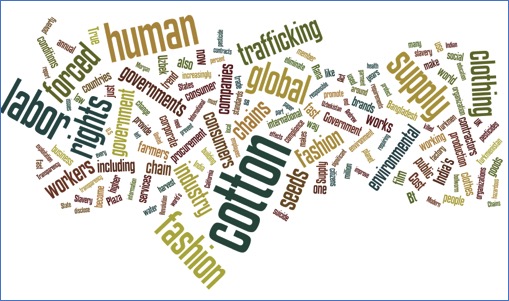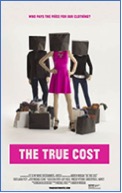June, 2017 Monthly Reflection
June 1, 2017Are We Living Too Fast?
By Sister Jean Schafer SDS
Summer time! For some of us around the country that season is long in coming and often too short. For most of us we want to make the most of summer: enjoy a bit more leisure, travel, read a good book, wear those new summer clothes we bought during the spring sale – our ‘summer wish list’ goes on.
What we probably do not include in that list, however, is a growing consciousness of our role in stopping or furthering the ‘fast fashion’ industry’s exploitation of both the producers and consumers of cheap clothing. To become conscious of our role in this global web of overproduction, human trafficking and environmental pollution is a challenging learning curve. Caring and courageous people are taking up that challenge. By reading further you may sense an invitation to get involved, as well!
What Is ‘Fast Fashion’?
A brief definition: “Fast fashion is the quick turnover of trendy, cheaply-made clothing that often ends up in landfill.” The tradition of introducing new fashion lines on a seasonal basis is eroding as some fast-fashion retailers introduce new products multiple times in a single week.
Three major components link us into that reality and its exploitative outcomes.
- Trendy clothing: The retail industry has convinced the consumer through slick advertising that a new fashion is on the shelves and s/he has to buy it before it goes out of style. Thus, consumers are conditioned to visit retail stores often and succumb to purchase something trendy, whether needed or not.
- Quick and cheaply made: Those who sew the clothing are forced to work long hours for very low wages under unhealthy conditions, so the retailer can offer us the cheap price that satisfies our expectation of ‘affordable’. Workers have few or no rights and most are caught in labor trafficking because they lack voice or options for better jobs.
- Landfill destinations: Because cheaply-made clothing does not last and because we did not pay much to own them, it is easy to toss out the ‘outmoded’ and buy the ‘new trendy’ replacement. Yes, we recycle, but thrift stores eventually resort to landfills to keep their racks full of ‘trendy’ clothes.
If you are ready for the challenge, let’s explore more deeply a few of the real facts and trends behind these components of the ‘fast fashion’ phenomenon.

The world now consumes about 80 billion new pieces of clothing every year. Clothing consumption has increased 500% in the US in just the last couple of decades. Roughly 98% of clothing sold in America are actually made overseas, compared to 5% in 1960. Meanwhile, the global fashion industry earns about $3 trillion per year.
What the ‘Fast Fashion’ industry won’t tell you:
- The fashion industry is designed to make you feel “out of trend” after one week.
- ‘Discounts’ aren’t really discounts.
- There are hazardous chemicals, including lead in your clothing.
- Clothing is designed to fall apart.
- Beading and sequins may be an indication of child labor.
There are about 40 million garment workers in the world today; 85% of them are women. On average, only 0.5 to 3% of the cost of production for the average item of clothing goes to the worker who made it – i.e., 30 cents of a shirt costing $10 to make. Then there are also workplace abuses: wage theft (not paying overtime, violating minimum wage laws), lack of building safety, and underage employees, some as young as 11 years old.
The average hourly wage for garment workers:
Bangladesh $0.24
Cambodia $0.45
Pakistan $0.52
Vietnam $0.53
China $1.26
What ‘Fast Fashion’ Retailers Earn:
- GAP’s CEO Arthur Peck’s annual compensation: $3,510,000; Reported accumulated compensation: $30,468,880
- Hennes & Mauritz is Europe’s largest fashion retailer. H&M CEO Karl-Johan Persson’s net worth: $3,000,000,000. He is grandson of H&M’s founder. The Persson family’s worth: $26,000,000,000. (They own 36% shares in H&M.)
What Does ‘Fast’ Look Like?
Farfetch.com announced that it would now be delivering Gucci in 90 minutes in 10 major cities around the world. *F90 delivery is available from store to door in the following cities: London, Paris, Madrid, Milan, New York City, Los Angeles, Miami, Dubai, Tokyo, São Paulo.
Environmental Impact of ‘Fast Fashion’
- Apparel accounts for 10% of global carbon emissions, the second largest industrial polluter, second only to oil.
- It takes up to 700 gallons of water to produce the cotton needed to make a single t-shirt.
- Cotton production is now responsible for 18% of worldwide pesticide use and 25% of total insecticide use.
- We churn out clothes at an alarming rate — Americans now buy five times as much clothing as they did in 1980.
- Pesticide-infused cotton fields in Texas and India coincide with high incidences of cancer deaths of farmers.
- Nearly 70 million barrels of oil are used each year to make the world’s polyester fiber, which is now the most commonly used fiber in our clothing. But it takes more than 200 years to decompose.
- In the US alone, 12.8 million tons of clothing are sent to landfills each year (about 87 lbs of clothing per person every year). Massive landfills in developing countries, such as Haiti, give off poisonous gases and seep deadly chemicals into the waterways and oceans, as the synthetic materials rot.
- Textiles use 25% of chemicals produced worldwide, many of which are dumped into the environment after use. This water pollution coincides with a massive rise in local cancer and birth defects, especially among children.
- In 2014, the US produced 35.4 million tons of containerboard, a large proportion of which becomes disposable packaging used in e-commerce.
Global Response to Tragedy
On April 24, 2013, 1,134 people were killed and over 2,500 were injured when the 8-storey Rana Plaza complex collapsed in Dhaka, Bangladesh. Workers said the building was unsafe. Yet managers forced them in and locked the doors.
This date was also when a Fashion Revolution was born and many people rallied to do something to right this terrible wrong.
“The old notion of a ‘good buy’ is that it is cheap and makes you look thin. A renewed notion: a ‘good buy’ for us as Catholics has ethical content. How was it sourced? How does it care for creation? How were the workers treated in the making of this garment? How were they paid?” (The Human Thread Campaign.org: Five Reasons)
What Can We Do?
View the documentary: The True Cost.
This 2015 documentary film directed by Andrew Morgan focuses on fast fashion. Morgan examines the garment industry and links it to consumerism, mass media, globalization, capitalism, structural poverty, oppression, and human trafficking. The documentary is a collage of several interviews with environmentalists, garment workers, factory owners, and people organizing fair trade companies or promoting sustainable clothing production. (True Cost Movie Website)
Take the Pledge to become a responsible consumer and educate yourself on the true cost of fashion:
- I pledge to be a responsible consumer and remain aware of the environmental and human effects of the fast fashion industry.
- Buy clothes made with sustainable fibers (recycled polyester, organic cotton).
- Ask the brands you buy from how their clothes are made—tweet at them or ask retailers when you are in stores about where, how, and who makes their clothing.
- Recycle clothes at thrift stores, vintage stores, or donation locations.
- Participate in clothing-swap meet-ups—it’s fun.
- Buy what you need, not always what you want.
- Participate in “slow fashion.”
- Buy clothes you love, that last, and that have an exceptional warranty policy to help you mend them over time.
- Wash your jeans less.
Search the Internet for information on the harms of ‘fast fashion’:
- International Labor Rights Forum’s campaign on Uzbekistan cotton
- The Human Rights Watch 2015 Report “Work Faster or Get Out”
- LA Times story on USA Labor Abuses
- KPCC story “Labor Department Investigation Finds 85 Percent of LA Garment Factories Break Wage Rules”
Search the Internet for information on ways people and companies are working to counter ‘fast fashion’:
- The California Transparency in Supply Chains Act of 2010 (“CA-TISCA”) is the first disclosure law to address human trafficking and slavery within the global marketplace. CA-TISCA requires every retail seller and manufacturer who does business in the state of California and has annual worldwide gross receipts exceeding $100 million “to disclose its efforts to eradicate slavery and human trafficking from its direct supply chain for tangible goods offered for sale.”
Eligible companies have to post this information on their websites “with a conspicuous and easily understood link to the required information placed on the business’ homepage.” (California Civil Code Section §1714.43). With California being the 8th largest economy in the world, CA-TISCA affects companies with a combined revenue of $48.4 trillion in 2016, among them many Fortune 1000 companies.
Corporate Compliance with the California Transparency in Supply Chains Act: Anti-Slavery Performance in 2016 - 35 Fair Trade and Ethical Clothing Brands Betting Against Fast Fashion
- The Human Thread: Catholics for Clothing with a Conscience
- Catholics for Clothing with a Conscience’s Mission Statement: “Inspired by Catholic Social Teaching, the Catholic Campaign for Clothing with a Conscience seeks to foster Catholics’ awareness that promotes solidarity between the consumers of clothing and the people who produce them in order to create a more just economy and sustainable communities.”
The Human Thread Campaign: Facebook Page
The Human Thread Campaign: Our Mission - Alta Gracia Apparel: Founded in 2010 it is the only apparel company in the developing world that is independently certified in paying a living wage.
- Eileen Fisher: She started with $350 in savings. And a vision. Our vision is for an industry where human rights and sustainability are not the effect of a particular initiative, but the cause of a business well run. Where social and environmental injustices are not unfortunate outcomes, but reasons to do things differently.
Eileen Fisher: Values
Eileen Fisher.com: Human Rights Overview - Anti-Slavery Campaign Against Abusive Cotton Labor Standards in Uzbekistan
- The Cotton Campaign
- USA 2016 TIP Report
- Green Peace: Detox Fashion
- Clean Clothes Campaign (CCC)
General Resources:
- Wikipedia Definition of “Fast Fashion”
- Huffington Post: “5 Truths the Fast Fashion Industry Doesn’t Want You to Know”
- New York Times: “The New Meaning of Fast Fashion“
- Investopedia: Fast Fashion
- Huffington Post: Fast Fashion
- Human Thread Campaign: Care of Creation
- Human Thread Campaign: Five Reasons
Category: Awareness, Monthly Reflections

